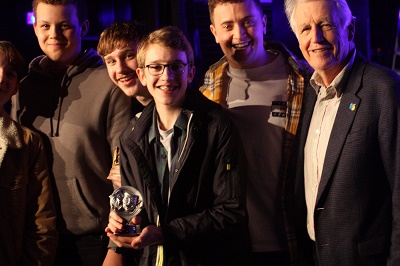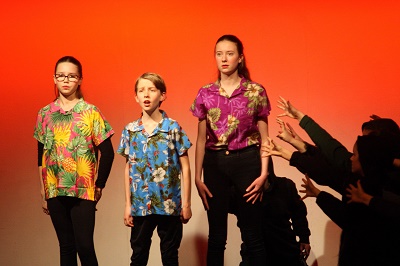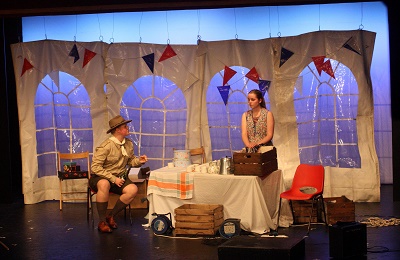
The
Barn Theatre,
25 Bluehouse Lane, Oxted, Surrey
RH8 0AA.
Tel:
01959 561811
Email: barntheatre
@btinternet.com

Southern Counties Drama Festival 2022
Click here to search this site
22nd - 26th February
Tony Goddard, (Host for the SCDF) introduced us to our Adjudicator for the week, Louise Manders who was making her first appearance at the Barn as Festival Adjudicator.
The plays in this year's festival were all of an extremely high standard. They benefitted from excellent feedback from the adjudicator who also took time to informally chat with Directors and actors both before and after the shows which was greatly appreciated.
And so to the first of the plays...:
Tuesday 22nd February
“Audrey and Me” by Jimmie Chinn performed by ACE Theatre CompanyThe Ace Theatre Company opened this year’s Southern Counties Drama Festival with a two-person play, Audrey and Me, starring Chrissie White as Audrey and David Burton as ‘me’ (Barry). The first scene is set in a hospital waiting room; Barry has been taken ill but, at this point, we do not know why. The play progresses, moving seamlessly through the year (signalled by subtle, yet effective, lighting and sound design), until it becomes clear that Barry has had a mental breakdown and is living full-time in hospital. In an emotional final scene, Audrey leaves her husband to embark on a new life, fuelled by an evident renewal of energy.
Audrey and Me is forty minutes long. Barry says two words; Audrey recites eighteen pages worth of dialogue. Chrissie White’s performance is impressive; her monologue is never-ending, but she handles it confidently. Throughout the play, she naturally works through a plethora of emotions; hope, grief, sadness, and exasperation to name a few.
Whilst White’s dialogue dominates, David Burton matches her verbal acting with a powerful display of physical acting. Instead of using words to convey emotion, Burton communicates through physical signs; wringing hands, deep breathing and disturbed facial expressions are all used effectively to signal serious emotional turmoil. A moving play, well executed by talented actors, effective direction, and sound technical design.
Nominations for the Jill Perry Award for Best Actress – Chrissie White (Audrey) & Best Adult Production
Best Adult Actor – David Burton (Me)“Permission to Cry” by David Campton performed by Oast Theatre, Tonbridge
Permission to Cry, by David Campton, explores the hypocritical age that we live in. It follows the emotional journey of Julia Gibbon, a junior minister, who is thrown into turmoil by the conflict between private and public morality. In the public sphere, Gibbon is an upright, community-centric member of the Establishment. In private, she is having an affair with Penelope Wright, a forthright journalist, and a thorn-in-the-side of the Establishment. When Wright is killed in a political rally, Gibbon is forced to confront insecurities and doubts she never knew she had.
Whilst Permission to Cry was published in 1996, many of the issues explored remain relevant today. These themes are effectively explored by a talented cast of actors supported by innovative stage direction, powerful lighting, and complimentary sound design. Elizabeth McCredie plays an excellent Julia Gibbon, confidentially portraying the powerful emotions of a person experiencing deep emotional turmoil. Elizabeth Portlock moves naturally between two strong female figures, and we never doubt her performance. Bob Brown similarly plays two characters with ease, and commands great stage presence. Sandra Barfield’s direction is striking, and simple props and scenery are used to draw the audience in.
Nominations for Best Adult Actor – Bob Brown (Councillor Eldon-Pugh and Dr Semple), the Jill Perry Award for Best Adult Actress – Elizabeth Portlock (Susan Little and Penelope Wright) & Best Adult Production
Wednesday 23rd February"Tuesday” by Alison Carr performed by Caterham School 4th Year Festival Group
Caterham School chose Alison Carr’s Tuesday as their submission for this year’s Southern Counties Drama Festival. The play takes place on an ordinary Tuesday that suddenly takes a turn for the worse when a tear rips in the sky above the school courtyard. Parallel worlds collide and an ‘Us and Them’ narrative develops. The play is light and playful, but touches on themes of friendship, family, identity, grief, bullying, loneliness, and responsibility.
Caterham School 4th Year Festival Group put on a confident rendition of Tuesday. Utilising every cast member, it is a good display of theatrical teamwork. Unison is strong and the youthful ensemble energetically portray a range of captivating themes and emotions. Particularly poignant was the Ash and Magpie two-way team played by Holly Dresner and Zoe Terrell respectively. With clever costuming and acting, the two play different variations of the same person, raising important questions surrounding identity. Sophie Van As’s performance of Cam touches on the theme of loneliness, whilst Max Kersey (who plays Billy) captures the complicated feelings surrounding grief and loss.
Costuming is simple but effective. Light and sound are both used well, and help to communicate the change in pace, tone, and mood.“15 Reasons Not to Be In a Play” by Alan Haehnel performed by Glow Theatre Group
Glow Theatre Group dazzle, excite and captivate in their energetic interpretation of 15 Reasons Not to Be in a Play by Alan Haehnel. Performed by a talented group of young actors, the play does exactly what it says on the tin and gives us fifteen, comical (but often valid) reasons why you should definitely not be in a play. These include the horror of holding hands with the person next to you, facing harsh criticism from your parents, being painfully shy, and having PTSD from a play you were forced to perform at age six.
With eighteen performers, all given equal opportunity to shine, the energy of the play never wanes. Eccentrically decorated props, as well as clever lighting and sound effects, match the actors’ enthusiasm to create an entirely immersive experience. Comic timing is almost always perfect, much to the delight of the enthralled audience. Miss Griswold, Cecily, Jake, Travis, and the gaggle of old ladies shine particularly bright in this imaginative performance. Director Julia Ascott works collaboratively with the cast to deliver a play that keeps the audience on their toes, always guessing what might come next.
Nominations for Best Young Actor – Linus Davison, Adjudicator’s Award for Props & Best Stage Presentation
Thursday 24th February“Three Kings” by Stephen Beresford performed by LCA Stage Academy
For their 2022 festival piece, LCA Stage Academy adapted and performed Three Kings, written by Stephen Beresford. The play follows its protagonist, Patrick, as he traces the history of his estranged father’s life and attempts to navigate their complicated relationship. Though originally written for one actor, LCA performs the piece as an eight-hand ensemble, with seven of the group playing different versions of Patrick.
Innovative and effective direction drives LCA’s adaptation of Three Kings and allows all eight actors to shine. Clever staging by director Mathew Harris, combined with brilliant use of props, lighting and sound, creates a truly captivating piece of drama. Transitions between scenes are slick and music is used effectively to establish changing moods.
LCA’s acting throughout Three Kings is impressive and each performer handles their part confidently. Working successfully as a team, they move through the script with ease to capture the different stages of Patrick’s life. A very talented young cast with great potential, LCA explores deep familial themes to deliver a play that is both heart-breaking and hilarious.
Best Young Actor – Samuel Gower (Dad)
Martin Patrick Award for Best Director – Matthew Harris
Best Youth Production
VERLINGUE FESTIVAL WINNERS AWARD
“Hoodie” by Lindsay Price performed by Glow Theatre Group
Hoodie, by Lindsay Price, explores the everyday struggles faced by young people as they transition into teenagerhood. Questions including ‘What do I wear’, ‘What if I wear the wrong thing’, ‘What is she wearing’ are central to the piece, and are used to explore the emotional complexities surrounding image and appearance.
Glow’s adaption of Hoodie begins with a striking piece of choreography that establishes the idea of the socially restrictive “clump”. Lighting is bold, colourful, and interesting, designed to contrast with the purposefully non-distinguishable “hoodies”. Glow’s choice of music is brilliant and helps to highlight the play’s dominating themes: change, social pressure, and teenage angst.
Though the questions raised push the audience to reflect on deeper societal issues, Hoodie’s enthusiastic cast confront them with a playful, and comic, attitude. With an ensemble of twenty-six performers, a high level of energy is sustained throughout to entertain a captivated audience. The appearances of Dr.Lou (played by Skye Wilkinson) at different stages of the play are particularly charming.
Hoodie is an immersive experience, successfully delivered by a group of confident young actors whose talents are highlighted by fantastic direction, choreography, and stage production.
“Gosforth’s Fete” by Alan Ayckbourn performed by Heathfield Youth DramaGosforth’s Fete by Alan Ayckbourn was first performed in 1974. In true Ayckbourn style, it is a comic play that ridicules the human need to put on a brave face and keep up appearances, whilst the ship is sinking. Gosforth’s Fete begins like any other village fete: in the tea tent. However, as the day wears on, disaster follows disaster until total chaos ensues.
In Heathfield Youth Drama’s re-enactment of the play, Charlie Mitchell brilliantly plays the rather catastrophic character of Gosforth, commanding the stage with confidence and well-rehearsed comedic timing. Maisie Bell is a great Milly Carter, the not-so-innocent village spinster. Her fiancé, Stewart, played by Gareth Cheney, has the audience howling from the moment he appears on stage. Tom Cassidy is the perfect bumbling vicar, whilst Jamie Blake takes on the role of up-tight Tory councillor, Mrs. Pearse, with ease.
The set is incredibly well designed and transports the audience to a place most have been before: the quintessential British summer fair. The cast’s use of a wide range of props is assured and essential for comic effect.
Nominations for Best Young Actress – Maisie Bell (Milly) & Adjudicator’s Award for the Final Scene
Best Stage Presentation
Friday 25th February“Shakers” by John Godber performed by Heathfield Youth Drama
Four waitresses in a cocktail bar reflect on the abuse and harassment they have to put up with in their job, particularly from the male customers. As one memorably remarks: “The tips are few. And the basic manners too”. This was a challenging piece because it required the cast to rapidly and frequently switch back and forth between their own roles as waitresses and others they impersonated, including the oafish male customers. Direction from Maryjane Stevens and Mary Pearson gave us clever changes in lighting and music and imaginative uses of stage furniture which enabled the audience to quickly understand the shifts. Ella SlinHawkins, as Mel, stood out with a bold and confident performance and good comic timing. She made the switch to impersonating a revolting male customer with great authenticity and clearly enjoyed playing this role. Her body language throughout the piece showed she has learnt that reacting is as important as acting. Holly Christain, as Nicky, used the opportunities she had from the script to give us a performance of great enthusiasm and emotion. Beatrice Walker’s monologue as Carol, the underrated graduate who couldn’t get a decent job, was moving and Libby Thomas, as Adele, showed genuine anger in her plea to be able to get out of her wretched job. This was very much a team performance, each actor supporting the others, and their sheer collective pleasure in playing the piece shone through.
Nomination for Best Stage Presentation“Living with Lady Macbeth” by Rob John performed by Glow Theatre Group
Lily is desperate, almost obsessively so, to play Lady Macbeth in her school’s forthcoming production of the Shakespeare play but she has never acted before. She is thought by her classmates, her teacher and her family to be untalented and unattractive. Of course she produces a stunning audition but, in a clever plot twist, decides she has proved herself already and after all doesn’t want the part. A large cast of fourteen had clearly been well directed by Bethan Parkin to use the stage and its simple set to maximum effect and it never looked too crowded or congested. In particular, the six classmates performed their coordinated movements, even down to the flicking of their identical ponytails, with great skill and humour. Lucy Roe, in the lead part of Lily, commanded her role with great confidence, stage presence and appropriate emotion. She was ably supported by Millie Yeo, playing Lily’s only friend, Monica, whose quiet and understated loyalty, contrasting with Lily’s exuberance, showed a maturity in her acting abilities beyond her years. Charlie Smith and Elena Arveschoug brought great comic timing to their roles as Lily’s doubting parents and mention must be made of an extraordinary cameo performance by Brooke Patterson as the drama teacher, Ms Bevis, who’s authentically over the top facial expressions and hand movements were a joy to watch. Lighting and sound were effectively used to match the impressive pace of this impactful performance. Nomination for Best Young Actress - Lucy Roe (Lily Morgan)
Best Young Actress – Brooke Patterson (Ms Bevis)“Bouncers” by John Godber performed by Heathfield Youth Drama
Bouncers is a companion piece to Shakers, performed earlier in the evening also by Heathfield Youth Drama. Originally written in 1977 and then revised in the early 1990s, its impersonations of young women club goers by the four male bouncers felt at times to lapse into rather outdated stereotyping. This is not to criticise the four actors, who brought to the play the exactly appropriate level of laddish brio that the script required. Kyle Brown and Mary Pearson’s direction gave us a stunning and dramatic set, with four beer barrels providing both practical and symbolic significance, and music and a back projection that riveted our attention from the start. These were four young men who were sometimes bouncers, sometimes clubbers themselves and sometimes the young women they encountered in the clubs. This was a hard edged piece, with none of the appeals for empathy that we saw in Shakers. Charlie Swan, as Eric, effectively bossed the action along. All four had clearly worked hard on finding body language to convey their female impersonations and Sam Arnott, as Les, effectively pushed this to the limits, as well as displaying good comedic timing. Rafe Jackson as Judd and Theo Walker as Ralph contributed in equal measure to the fast pace and energy of the production. In essence, this was a performance requiring a collective male assertiveness and bravado and one that the cast captured with skill.
Nomination for Best Youth Production
Adjudicator’s Award for the four Bouncers
Saturday 26th February (Matinee)“Aesop’s Famous Fables and Twisted Tales” by Peter Nuttall performed by Glow Theatre Group
This was a charming piece in which the younger members of the Glow entourage performed four of Aesop’s well known morality tales. There was an astonishing opening of sound and vision featuring the whole cast of nineteen on stage acting out a climate change demonstration with the theme of ‘reuse – recycle’, cleverly also referencing the use of the ancient fables. The Lion and the Mouse featured Aggie Peachy as a suitably narcissistic lion and Charlotte Mellington, who managed to convey both timidity and self confidence in equal measure as the mouse, while epitomising her character’s description as ‘bony and wispy’. In The Hare and the Tortoise, Thea Stokes as the hare showed great impatient and agitated energy as she cavorted around the stage, occasionally manically checking her mobile phone. Meanwhile, Romilly Luck’s tortoise was all calmness and control, particularly in her going nowhere slow motion steps. Mention must also be made of Caitin Daly’s North Wind, whose incredulity that she could be outwitted in her contest with the sun was well communicated. Throughout, all the cast members were engaged in the action and stayed in role. Thalia Selby’s direction gave us a well-schooled cast full of joyous bouncing energy, imaginative and colourful costumes, extraordinary props to represent the belly and other body parts, excellent use of lighting and music and a pleasure to watch from beginning to end.
“Arabian Nights (abbreviated)” by Dominic Cooke performed by Heathfield Youth Drama
The show must go on and this production certainly rose to that well established principle of theatre. Many of the original cast of over twenty had had to withdraw because of illness, resulting in replacements coming in at a few days’ notice or cast members having to double up with new roles. One can only admire the spirit and enthusiasm of this largely very young cast to get through it, despite the inevitable disruptions. Keren Keeler-Moore and Mary Pearson’s direction gave us a charmingly well-lit opening of night sky and moon to set the tone and an imaginative use of a few black blocks as the only stage furniture enabled a seamless transition between the introductory scene and the two main tales. Much work had gone into the colourful costumes. A sound track of a repeated song ‘Please Tell me a Story’ gave effective punctuation to the narrative. All the young actors did their very best to keep the action going. Particularly noteworthy were the contributions from those playing Ali’s Wife (Lydia Parker), who brought energy and pace to the action involving her, and Kassim (Jonti Hudson), who was confident, with a good command of the pace and rhythm of his lines. The Captain of the Thieves (Jean-Jacques Dupasquier) engaged the audience and died impressively! The whole cast should be praised for overcoming adversity and ensuring their contribution to the Festival was not lost.
Saturday 26th February“Everyman” adapted by Carol Ann Duffy performed by Glow Theatre Group
Jackie Driscoll’s direction smacked the audience to attention with an opening of a stunning orange lit set, electronic signs and music at the limit of tolerance, depicting a well-choreographed happy hour club scene. Once into the story, Lelia Prime as God showed good command of her words and a strong performance throughout, particularly in explaining the plot to the audience. Dom Semwanga as Death developed his menace throughout the play so that, by the climax, he was a truly sinister and chilling character. Evan Moynihan, as Everyman, made convincingly plaintive pleas to be spared his inevitable demise and was physically very aware of how to use his body to drive through his emotions. In a scene with Everyman’s family, we saw well considered performances from Eloise Smith as his mother and Kieran O’Brien as his father. Megan Filipe-Harrington, as Everyman’s sister, resentful of his neglect of his parents, showed excellent facial expressions and displayed her pent up anger in the way she folded washing with great acting skill. A very young Everyboy, who came on riding a scooter round the stage, was played with such inner confidence and naturalness by William Shackleton that he stole the short scene he was in without any intention to do so. All other parts were played with skill and were well choreographed, particularly the Worldly Goods, in their shiny gold costumes. Altogether, this was a well handled cast whose performance provided great impact.
Nominations for Best Young Actor – Evan Moynihan (Everyman), the Martin Patrick Award for Best Director (Jackie Driscoll) & Best Youth Production“Tone Clusters” by Joyce Carol Oates performed by Oast Theatre, Tonbridge
Tone Clusters is apparently based on a true story of a murder in New York State in 1989, albeit with changed names and identities. We observe the parents of the young man accused being questioned in a TV studio by an unseen interviewer. The parents begin by a steadfast denial of their son’s guilt but, as the questions become increasingly challenging and bizarre, their resolution crumbles. Fiona Dunn directed this challenging piece with appropriate simplicity: a black set with two chairs side by side and facing the audience square on, regular and unchanging lighting and the interviewer apparently in front of the parents and therefore giving the sense that he was one of us in the audience. The actors remain seated for the whole time, apart from occasional brief moments of standing, but they both overcame what might otherwise have been a limitation by their very effective physical acting. As Frank, Andy Leggatt’s ability to convey a buttoned up, repressed tension through the tightness of his body and its movements, and particularly a face stretched taut with emotion, was of the highest standard. Hania Simons, as Emily, gave us a convincing display of gradual disintegration as she contorted her body to the progression of her hysteria. Both actors handled their lines with aplomb, with excellent cue biting, and their American accents never got in the way of the tone and timing required. The audience’s attention was held throughout this difficult and disturbing piece.
Nominations for Best Adult Actor – Andy Leggatt (Frank Gulick) & the Martin Patrick Award for Best Director (Fiona Dunn)
Jill Perry Award for Best Adult Actress – Hania Simons (Emily Gulick)
Best Adult Production
Reviews by Jess Muscio (Tuesday, Wednesday and Thursday) and Peter Shore (Friday and Saturday)
Photos by Mike Sutton



